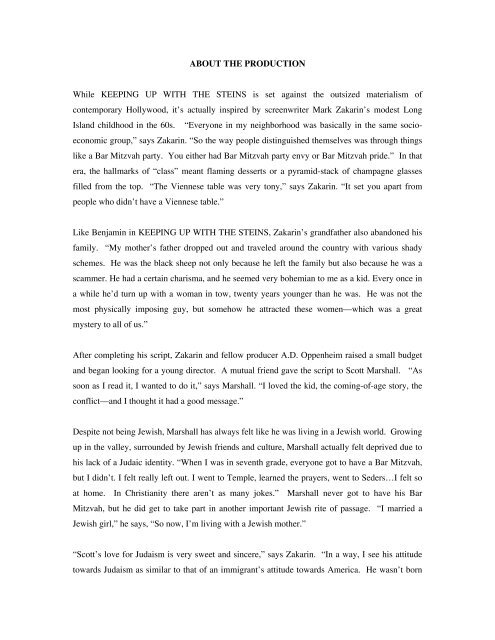KEEPING UP WITH THE STEINS - Champion Pictures
KEEPING UP WITH THE STEINS - Champion Pictures
KEEPING UP WITH THE STEINS - Champion Pictures
You also want an ePaper? Increase the reach of your titles
YUMPU automatically turns print PDFs into web optimized ePapers that Google loves.
ABOUT <strong>THE</strong> PRODUCTION<br />
While <strong>KEEPING</strong> <strong>UP</strong> <strong>WITH</strong> <strong>THE</strong> <strong>STEINS</strong> is set against the outsized materialism of<br />
contemporary Hollywood, it’s actually inspired by screenwriter Mark Zakarin’s modest Long<br />
Island childhood in the 60s. “Everyone in my neighborhood was basically in the same socioeconomic<br />
group,” says Zakarin. “So the way people distinguished themselves was through things<br />
like a Bar Mitzvah party. You either had Bar Mitzvah party envy or Bar Mitzvah pride.” In that<br />
era, the hallmarks of “class” meant flaming desserts or a pyramid-stack of champagne glasses<br />
filled from the top. “The Viennese table was very tony,” says Zakarin. “It set you apart from<br />
people who didn’t have a Viennese table.”<br />
Like Benjamin in <strong>KEEPING</strong> <strong>UP</strong> <strong>WITH</strong> <strong>THE</strong> <strong>STEINS</strong>, Zakarin’s grandfather also abandoned his<br />
family. “My mother’s father dropped out and traveled around the country with various shady<br />
schemes. He was the black sheep not only because he left the family but also because he was a<br />
scammer. He had a certain charisma, and he seemed very bohemian to me as a kid. Every once in<br />
a while he’d turn up with a woman in tow, twenty years younger than he was. He was not the<br />
most physically imposing guy, but somehow he attracted these women—which was a great<br />
mystery to all of us.”<br />
After completing his script, Zakarin and fellow producer A.D. Oppenheim raised a small budget<br />
and began looking for a young director. A mutual friend gave the script to Scott Marshall. “As<br />
soon as I read it, I wanted to do it,” says Marshall. “I loved the kid, the coming-of-age story, the<br />
conflict—and I thought it had a good message.”<br />
Despite not being Jewish, Marshall has always felt like he was living in a Jewish world. Growing<br />
up in the valley, surrounded by Jewish friends and culture, Marshall actually felt deprived due to<br />
his lack of a Judaic identity. “When I was in seventh grade, everyone got to have a Bar Mitzvah,<br />
but I didn’t. I felt really left out. I went to Temple, learned the prayers, went to Seders…I felt so<br />
at home. In Christianity there aren’t as many jokes.” Marshall never got to have his Bar<br />
Mitzvah, but he did get to take part in another important Jewish rite of passage. “I married a<br />
Jewish girl,” he says, “So now, I’m living with a Jewish mother.”<br />
“Scott’s love for Judaism is very sweet and sincere,” says Zakarin. “In a way, I see his attitude<br />
towards Judaism as similar to that of an immigrant’s attitude towards America. He wasn’t born


